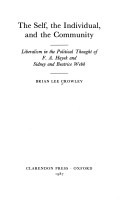Traditional political theory has placed the individualist libertarian F.A. Hayek and the utilitarian socialist planners Sidney and Beatrice Webb at opposite ends of a political spectrum. This book argues that, while the practical philosophies of Hayek and the Webbs are mutually antagonistic, they originate, at a deeper level, from subtly different interpretations of a shared tradition. Dr Crowley draws attention to the underlying sympathies and affinities linking their works, and views all three as bona fide bearers of the liberal banner. An examination of the ideas of these three thinkers serves as a springboard for a detailed examination of the relationship between economics, politics, and sociology in the Liberal intellectual tradition. Dr Crowley discusses what he feels to be the limitations of liberalism and shows why the theories of self, knowledge, and social relations on which liberal views are based cannot be sustained. He concludes that liberalism fails to take into account the idea of community, and in its search for objective knowledge is essentially anti-political, and therefore removed from the real world.
Politics, he says, through its search for the common good, encourages discussion and persuasion, and ultimately creates a context in which people can learn to reason and judge. Dr Crowley believes that because the philosophy of liberalism has limited (primarily economic) application, it must learn to co-exist with other philosophies concerned with non-economic aspects of man, particularly as they touch relations between the indvidual and the communities of which he is a part.
- ISBN10 0198274971
- ISBN13 9780198274971
- Publish Date 1 October 1987
- Publish Status Out of Print
- Out of Print 20 March 2003
- Publish Country GB
- Publisher Oxford University Press
- Imprint Clarendon Press
- Format Hardcover
- Pages 304
- Language English
